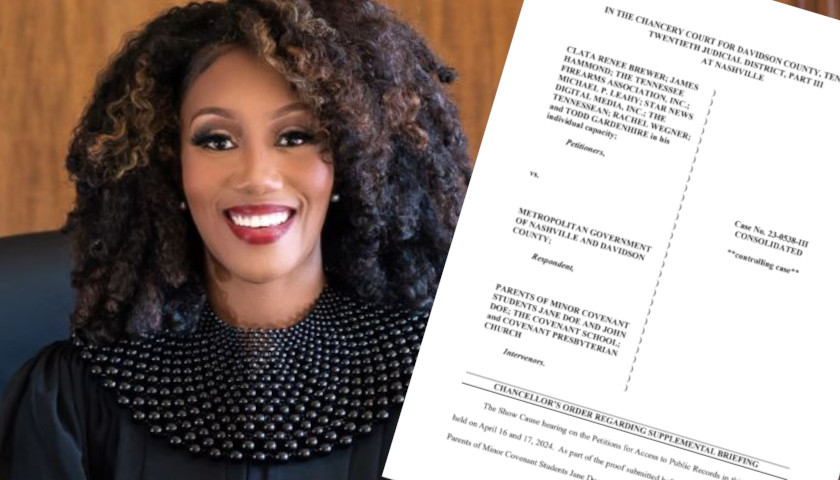Live from Music Row Tuesday morning on The Tennessee Star Report with Michael Patrick Leahy – broadcast on Nashville’s Talk Radio 98.3 and 1510 WLAC weekdays from 5:00 a.m. to 8:00 a.m. – host Leahy welcomed TN (R) State Representative Susan Lynn to the studio.
During the third hour, Lynn outlined the Tennessee General Assembly’s upcoming special session that will address education by initiating a summer session to help kids catch up from the closures due to COVID since last March. She also explained how she has heard real-life stories of children that have struggled with online learning those with disabilities.
Leahy: So you have made time from your busy schedule on the day that the Tennessee General Assembly convenes for a special session on education. So thanks for spending an hour with us here in the studio. Tell us what’s on the agenda in this special session.
Lynn: Well, the learning loss of the little ones in school and what during COVID they’ve been schooled a lot at home. They’ve been schooled over the computer and things have been very inconsistent and they’ve lost a lot of learning.
Leahy: We’ve seen all sorts of reports that their reading comprehension, their math is really down.
Lynn: It is.
Leahy: Parents tell me all the time that it’s virtually impossible actually to have this virtual learning online with young kids particular. They don’t have the attention span to sit in front of a computer and it’s very been very destructive to the learning process.
Lynn: And also these computer programs are just not intuitive. We have three grandchildren in third-grade second grade and kindergarten so we have had to educate because Mommy and Daddy have to work. We have had to educate all three of them. These programs are non-intuitive. There are terrible problems connecting. And even when the session is on I just don’t see that they learn that much. I really don’t. And so there has been tremendous learning loss. We have complained. I know I have complained terribly to the governor and the administration all during COVID about how things are going or not going.
Leahy: So just you and me here talking. When you say you complain to the governor, how does that interaction happen? Do you knock on the door of the governor’s office and say, Governor Lee, it’s Susan Lynn here. Can I come in and complain to you? What happens there?
Lynn: Well generally it will be on a phone call.
Leahy: It’s a phone call.
Lynn: Because of COVID.
Leahy: Okay, so ring, ring, ring, I’m the governor, and your Susan and you say, governor, I want to talk to you about something. What happens?
Lynn: Well a lot of times the meeting was called for something else. and then it’s hey, I need to say something and say something about how it’s going. And these are real-world stories. Another thing that has gone terribly wrong is students with disabilities. I mean, it’s awful. It’s been awful.
Leahy: We’ve had several callers call in specifically to talk about the difficulties of students with disability in this COVID period. And they’re very unhappy.
Lynn: Oh, it’s awful. And please call your legislator. If you’re listening to me, call your state legislators office. They will call the State Department of Education. They have to provide the services that your child is not getting. Please don’t take no for an answer from the locals. Call your state legislator. They have to provide those Services. I have called for several families and it is really awful. This whole COVID-19 has been so detrimental to our children’s education it’s heartbreaking. And I really fear for the future.
Leahy: Well you and I fear for the future for many reasons.
Lynn: Yes we do. Totally. (Laughter)
Leahy: But of course people listen to this program because we present positive solutions, even in this relatively fearful period of time. Back to that conversation with the governor. (Laughter)
Lynn: It’s usually an anecdotal story. Oh, ok, ok. It’s not lost. It’s not lost.
Leahy: So you tell the governor a story about how something is not quite working and he says well, thank you so much, Susan, for bringing up yet another problem I need to deal with. (Lynn Chuckles) What does he say to you?
Lynn: Oh, no, it’s not like that at all. You know, there’s a lot of anecdotal stories that we bring up from our own personal experience or constituents. And we also bring them up to the legislative liaisons because we need problems addressed and these problems need solutions. And we look to and as a legislator you never let them forget that problem and that there needed to be a solution to it. And when the session meets that’s the time when we make these solutions. A lot of times there already is a solution. So that’s why you should call your legislator and ask for that help.
Leahy: So special session. What is the number one priority in this special session on education?
Lynn: Reading. Improving reading for students.
Leahy: Well first, before COVID in many districts reading comprehension was not that great to begin with and now it’s even worse. So what will the legislation propose? what are its chances of passing and becoming law? and how will that improve reading for K-12 students in Tennessee?
Lynn: Well, there are four bills. three are actually implementation bills that would help the students. and one is the funding bill. And so one of the bills addresses that we are still going to test the students. I hear from my district that there’s a lot of activists who say no testing. No testing. If you do not test how can you know how students are doing? It’s ridiculous.
Leahy: So there’s a desire to keep the testing? Just personally, I hate all sorts of tests. Hate it! Hate it all. But that’s another long discussion.
Lynn: You have to measure. The taxpayers of the state of Tennessee provide a lot of money over 6 billion dollars a year to our local school districts, we need to be accountable for that money. We need to know how they’re doing. So we will test and see how the students are doing. However, these tests won’t be punitive to the teachers.
If it shows that the students have had significant reading loss they don’t have to worry about being penalized for that. Then next piece of legislation is going to create a summer school with about six weeks of summer school to address that summer time reading loss. And then also they’ll be an added after school, school to address that reading loss.
Leahy: So it’s a catch-up summer school session because all these kids have gotten behind?
Lynn: It is. and then we are going to enforce, we do have a law right now that if you are not a good reader, you will not advance to the next grade. that is going to be enforced.
Leahy: Now, that would be interesting because I mean just even before all this, I got the impression from talking to folks that there was a lot of shall we say, you know social advancement. Is that the word, social advancement?
Lynn: Social promotion.
Leahy: And if you couldn’t read they would advance you to the next grade, even though you weren’t at the proficiency level you needed.
Lynn: And how much more would that happen without the testing? you have to know how they’re reading. You can’t just guess at it and say oh you sound like you’ve read pretty well and comprehend pretty well. But yes, there probably is but here’s what this will do. Ironclad. You will not exactly advance to the next grade. However, we will make tutoring help available for you and in school help available for you.
So you leave the classroom during those classes aren’t as meaningful and you get that help. And you can attend the summer reading camp. And so if you make progress, by the time fourth grade is going to start, let’s say you will then start fourth grade. But it will be an incentive. You know fear is always an incentive. I don’t want to be held back so yeah, I’m going to work really hard and practice my reading.
Leahy: I understand there’s a fourth bill having to do with using phonics and related methodologies to reintroduce them. I suppose or are heightened their use in elementary school. We were talking with Clay Doggett about that. He was pretty excited about that bill. Tell us about the bill and where you think that stands.
Lynn: I love the bill because phonics works. My children had phonics. I had something similar that was called ITA when I learned to read phonics.
Leahy: Way back and when you were a kid in Pennsylvania. You are from Pennsylvania?
Lynn: I was born in Philadelphia but I was raised in the lower state of New York about 60 miles north of the city.
Leahy: Where?
Lynn: Newburgh. Near New Paltz.
Leahy: New Paltz. Yes. I have a great-great-grandfather who founded New Paltz way back when. He was a French Huguenot. Way back when.
Lynn: Wow! How interesting. Right, so I had what was called ITA.
Leahy: So if you went to school in Upstate New York, you had a good education.
Lynn: I did.
Leahy: I went to school in Upstate New York and my dad was a principal there. And the teaching in our era was quite good at that time.
Lynn: I went to a private school. It was excellent. It was an excellent education. I’m so grateful.
Listen to the third hour here:
– – –
Tune in weekdays from 5:00 – 8:00 a.m. to the Tennessee Star Report with Michael Patrick Leahy on Talk Radio 98.3 FM WLAC 1510. Listen online at iHeart Radio.
Photo “Suan Lynn” by RepSusanLynn. CC BY-SA 4.0.









another insane politician ALEC is socialist